Corporate Governance Ethics and Corporate Social Responsibility Assignment 2022
VerifiedAdded on 2022/10/04
|10
|3234
|23
Assignment
AI Summary
Contribute Materials
Your contribution can guide someone’s learning journey. Share your
documents today.

CORPORATE GOVERNANCE, ETHICS AND CORPORATE SOCIAL RESPONSIBILITY
Secure Best Marks with AI Grader
Need help grading? Try our AI Grader for instant feedback on your assignments.
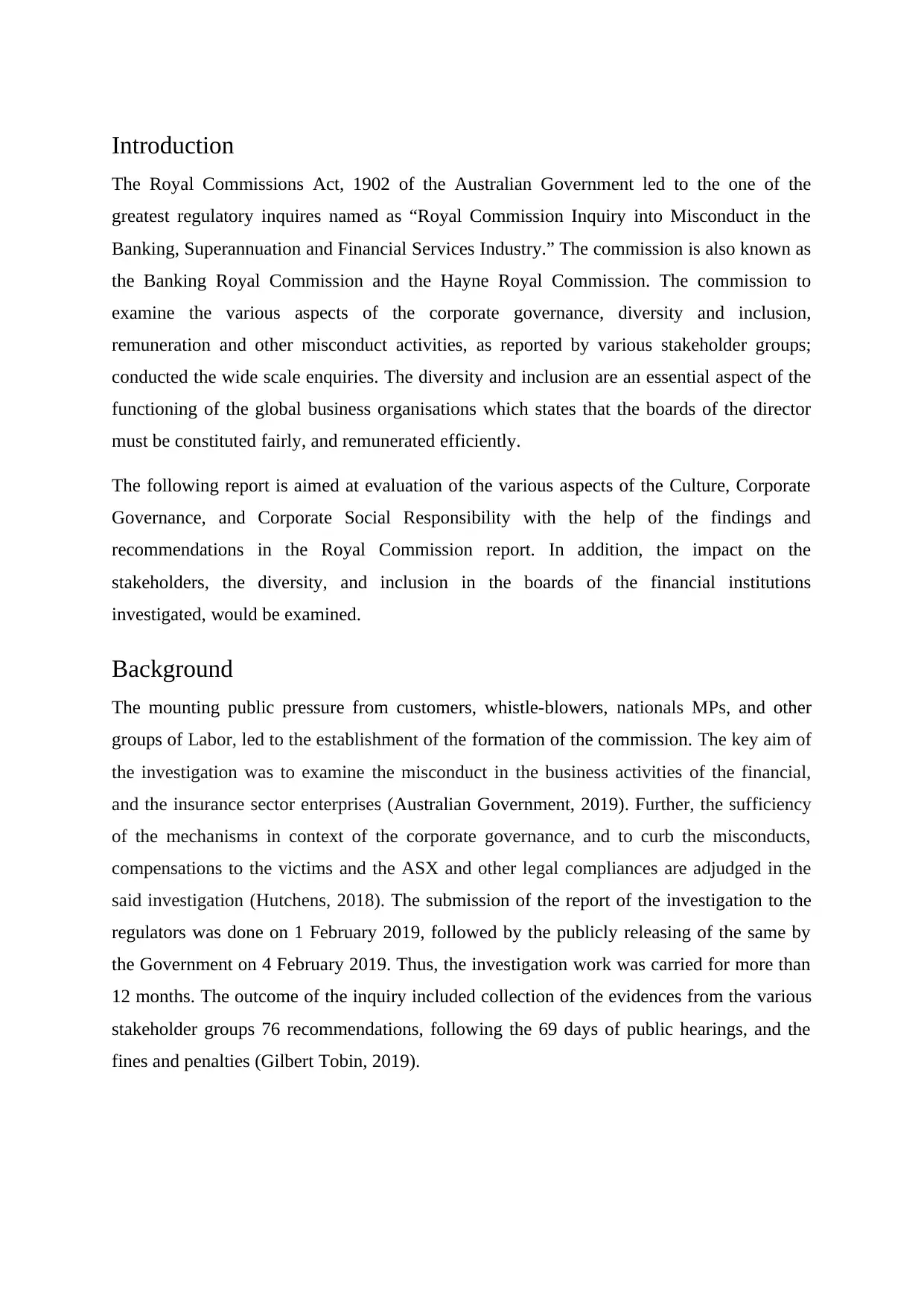
Introduction
The Royal Commissions Act, 1902 of the Australian Government led to the one of the
greatest regulatory inquires named as “Royal Commission Inquiry into Misconduct in the
Banking, Superannuation and Financial Services Industry.” The commission is also known as
the Banking Royal Commission and the Hayne Royal Commission. The commission to
examine the various aspects of the corporate governance, diversity and inclusion,
remuneration and other misconduct activities, as reported by various stakeholder groups;
conducted the wide scale enquiries. The diversity and inclusion are an essential aspect of the
functioning of the global business organisations which states that the boards of the director
must be constituted fairly, and remunerated efficiently.
The following report is aimed at evaluation of the various aspects of the Culture, Corporate
Governance, and Corporate Social Responsibility with the help of the findings and
recommendations in the Royal Commission report. In addition, the impact on the
stakeholders, the diversity, and inclusion in the boards of the financial institutions
investigated, would be examined.
Background
The mounting public pressure from customers, whistle-blowers, nationals MPs, and other
groups of Labor, led to the establishment of the formation of the commission. The key aim of
the investigation was to examine the misconduct in the business activities of the financial,
and the insurance sector enterprises (Australian Government, 2019). Further, the sufficiency
of the mechanisms in context of the corporate governance, and to curb the misconducts,
compensations to the victims and the ASX and other legal compliances are adjudged in the
said investigation (Hutchens, 2018). The submission of the report of the investigation to the
regulators was done on 1 February 2019, followed by the publicly releasing of the same by
the Government on 4 February 2019. Thus, the investigation work was carried for more than
12 months. The outcome of the inquiry included collection of the evidences from the various
stakeholder groups 76 recommendations, following the 69 days of public hearings, and the
fines and penalties (Gilbert Tobin, 2019).
The Royal Commissions Act, 1902 of the Australian Government led to the one of the
greatest regulatory inquires named as “Royal Commission Inquiry into Misconduct in the
Banking, Superannuation and Financial Services Industry.” The commission is also known as
the Banking Royal Commission and the Hayne Royal Commission. The commission to
examine the various aspects of the corporate governance, diversity and inclusion,
remuneration and other misconduct activities, as reported by various stakeholder groups;
conducted the wide scale enquiries. The diversity and inclusion are an essential aspect of the
functioning of the global business organisations which states that the boards of the director
must be constituted fairly, and remunerated efficiently.
The following report is aimed at evaluation of the various aspects of the Culture, Corporate
Governance, and Corporate Social Responsibility with the help of the findings and
recommendations in the Royal Commission report. In addition, the impact on the
stakeholders, the diversity, and inclusion in the boards of the financial institutions
investigated, would be examined.
Background
The mounting public pressure from customers, whistle-blowers, nationals MPs, and other
groups of Labor, led to the establishment of the formation of the commission. The key aim of
the investigation was to examine the misconduct in the business activities of the financial,
and the insurance sector enterprises (Australian Government, 2019). Further, the sufficiency
of the mechanisms in context of the corporate governance, and to curb the misconducts,
compensations to the victims and the ASX and other legal compliances are adjudged in the
said investigation (Hutchens, 2018). The submission of the report of the investigation to the
regulators was done on 1 February 2019, followed by the publicly releasing of the same by
the Government on 4 February 2019. Thus, the investigation work was carried for more than
12 months. The outcome of the inquiry included collection of the evidences from the various
stakeholder groups 76 recommendations, following the 69 days of public hearings, and the
fines and penalties (Gilbert Tobin, 2019).
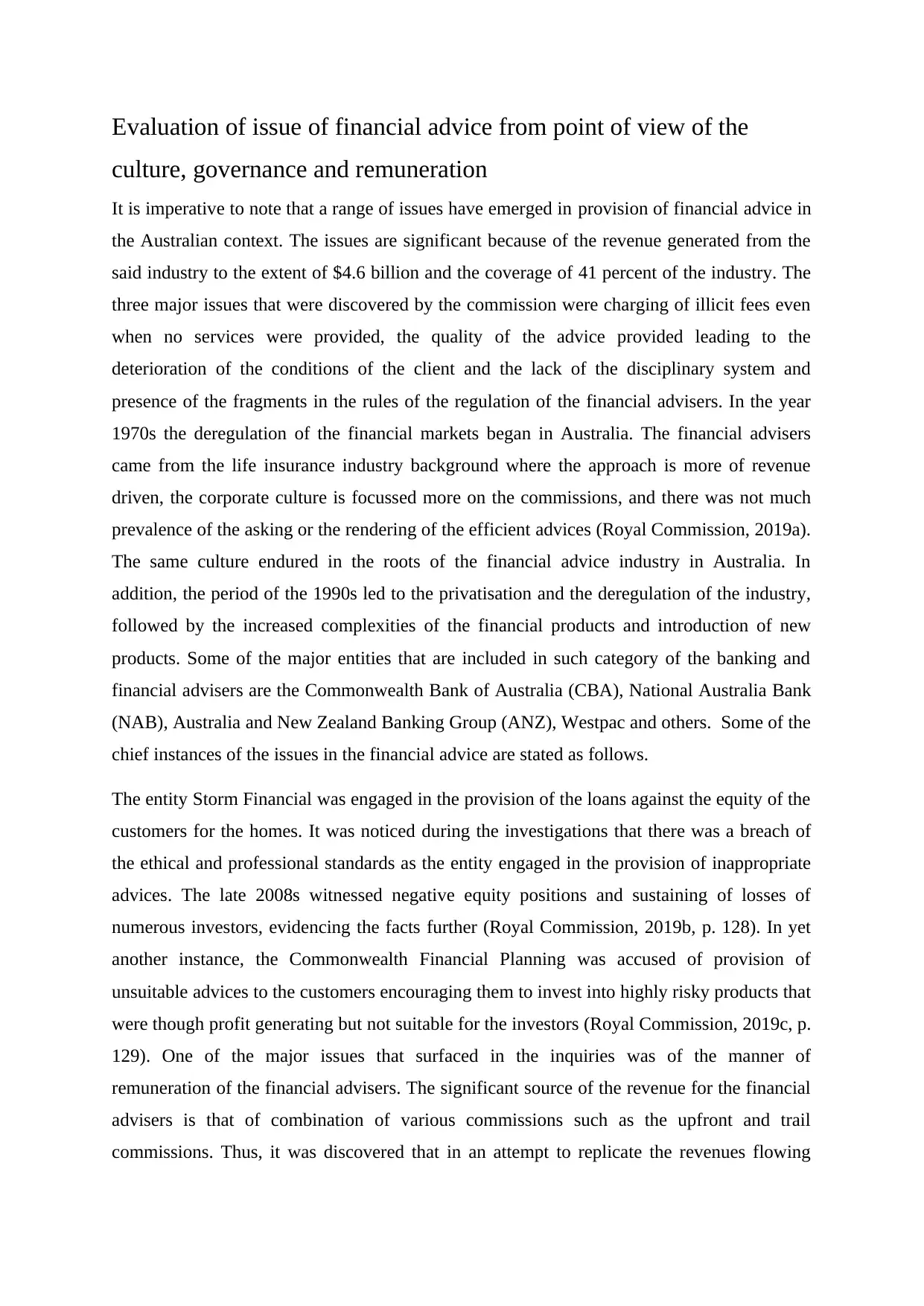
Evaluation of issue of financial advice from point of view of the
culture, governance and remuneration
It is imperative to note that a range of issues have emerged in provision of financial advice in
the Australian context. The issues are significant because of the revenue generated from the
said industry to the extent of $4.6 billion and the coverage of 41 percent of the industry. The
three major issues that were discovered by the commission were charging of illicit fees even
when no services were provided, the quality of the advice provided leading to the
deterioration of the conditions of the client and the lack of the disciplinary system and
presence of the fragments in the rules of the regulation of the financial advisers. In the year
1970s the deregulation of the financial markets began in Australia. The financial advisers
came from the life insurance industry background where the approach is more of revenue
driven, the corporate culture is focussed more on the commissions, and there was not much
prevalence of the asking or the rendering of the efficient advices (Royal Commission, 2019a).
The same culture endured in the roots of the financial advice industry in Australia. In
addition, the period of the 1990s led to the privatisation and the deregulation of the industry,
followed by the increased complexities of the financial products and introduction of new
products. Some of the major entities that are included in such category of the banking and
financial advisers are the Commonwealth Bank of Australia (CBA), National Australia Bank
(NAB), Australia and New Zealand Banking Group (ANZ), Westpac and others. Some of the
chief instances of the issues in the financial advice are stated as follows.
The entity Storm Financial was engaged in the provision of the loans against the equity of the
customers for the homes. It was noticed during the investigations that there was a breach of
the ethical and professional standards as the entity engaged in the provision of inappropriate
advices. The late 2008s witnessed negative equity positions and sustaining of losses of
numerous investors, evidencing the facts further (Royal Commission, 2019b, p. 128). In yet
another instance, the Commonwealth Financial Planning was accused of provision of
unsuitable advices to the customers encouraging them to invest into highly risky products that
were though profit generating but not suitable for the investors (Royal Commission, 2019c, p.
129). One of the major issues that surfaced in the inquiries was of the manner of
remuneration of the financial advisers. The significant source of the revenue for the financial
advisers is that of combination of various commissions such as the upfront and trail
commissions. Thus, it was discovered that in an attempt to replicate the revenues flowing
culture, governance and remuneration
It is imperative to note that a range of issues have emerged in provision of financial advice in
the Australian context. The issues are significant because of the revenue generated from the
said industry to the extent of $4.6 billion and the coverage of 41 percent of the industry. The
three major issues that were discovered by the commission were charging of illicit fees even
when no services were provided, the quality of the advice provided leading to the
deterioration of the conditions of the client and the lack of the disciplinary system and
presence of the fragments in the rules of the regulation of the financial advisers. In the year
1970s the deregulation of the financial markets began in Australia. The financial advisers
came from the life insurance industry background where the approach is more of revenue
driven, the corporate culture is focussed more on the commissions, and there was not much
prevalence of the asking or the rendering of the efficient advices (Royal Commission, 2019a).
The same culture endured in the roots of the financial advice industry in Australia. In
addition, the period of the 1990s led to the privatisation and the deregulation of the industry,
followed by the increased complexities of the financial products and introduction of new
products. Some of the major entities that are included in such category of the banking and
financial advisers are the Commonwealth Bank of Australia (CBA), National Australia Bank
(NAB), Australia and New Zealand Banking Group (ANZ), Westpac and others. Some of the
chief instances of the issues in the financial advice are stated as follows.
The entity Storm Financial was engaged in the provision of the loans against the equity of the
customers for the homes. It was noticed during the investigations that there was a breach of
the ethical and professional standards as the entity engaged in the provision of inappropriate
advices. The late 2008s witnessed negative equity positions and sustaining of losses of
numerous investors, evidencing the facts further (Royal Commission, 2019b, p. 128). In yet
another instance, the Commonwealth Financial Planning was accused of provision of
unsuitable advices to the customers encouraging them to invest into highly risky products that
were though profit generating but not suitable for the investors (Royal Commission, 2019c, p.
129). One of the major issues that surfaced in the inquiries was of the manner of
remuneration of the financial advisers. The significant source of the revenue for the financial
advisers is that of combination of various commissions such as the upfront and trail
commissions. Thus, it was discovered that in an attempt to replicate the revenues flowing
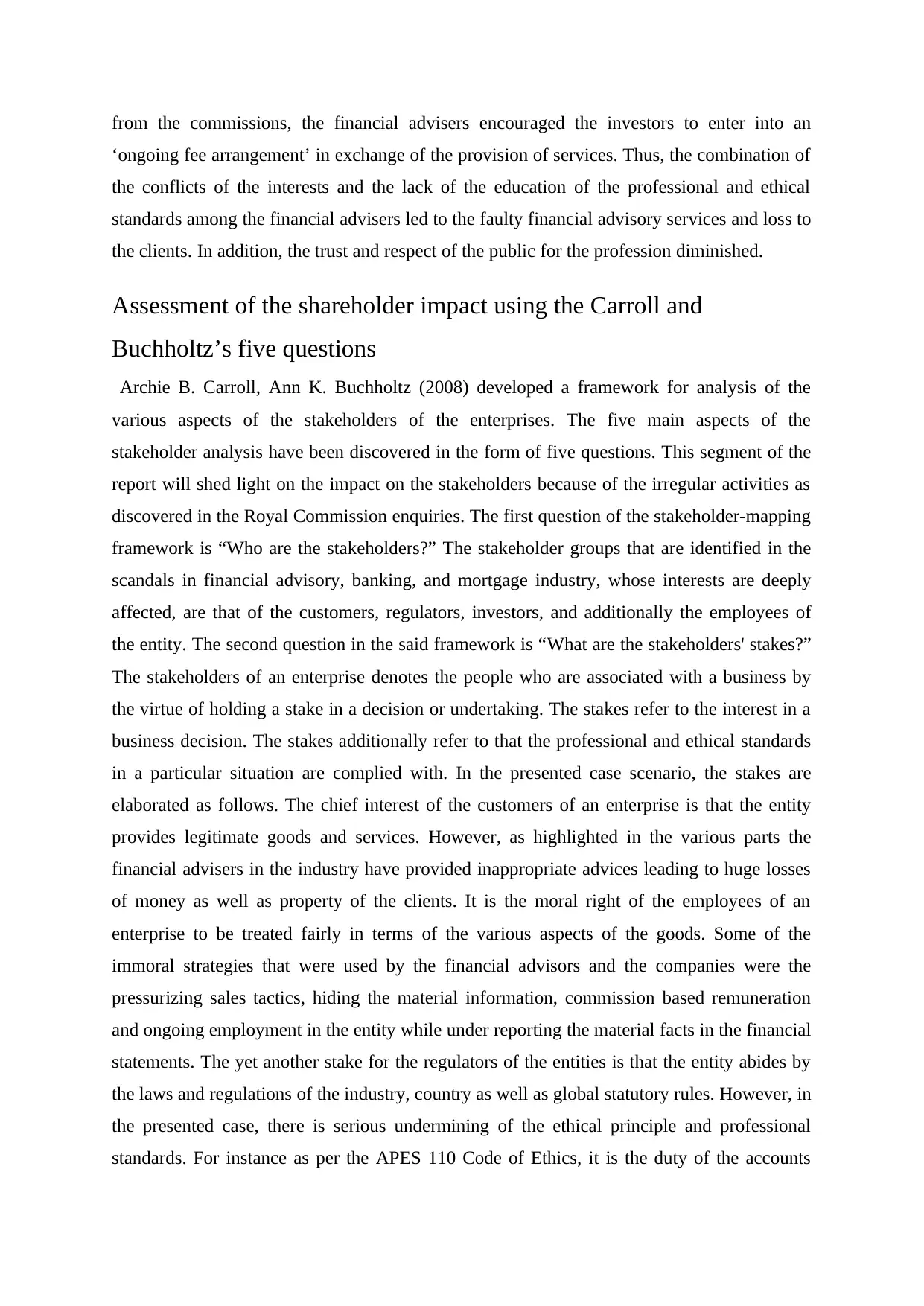
from the commissions, the financial advisers encouraged the investors to enter into an
‘ongoing fee arrangement’ in exchange of the provision of services. Thus, the combination of
the conflicts of the interests and the lack of the education of the professional and ethical
standards among the financial advisers led to the faulty financial advisory services and loss to
the clients. In addition, the trust and respect of the public for the profession diminished.
Assessment of the shareholder impact using the Carroll and
Buchholtz’s five questions
Archie B. Carroll, Ann K. Buchholtz (2008) developed a framework for analysis of the
various aspects of the stakeholders of the enterprises. The five main aspects of the
stakeholder analysis have been discovered in the form of five questions. This segment of the
report will shed light on the impact on the stakeholders because of the irregular activities as
discovered in the Royal Commission enquiries. The first question of the stakeholder-mapping
framework is “Who are the stakeholders?” The stakeholder groups that are identified in the
scandals in financial advisory, banking, and mortgage industry, whose interests are deeply
affected, are that of the customers, regulators, investors, and additionally the employees of
the entity. The second question in the said framework is “What are the stakeholders' stakes?”
The stakeholders of an enterprise denotes the people who are associated with a business by
the virtue of holding a stake in a decision or undertaking. The stakes refer to the interest in a
business decision. The stakes additionally refer to that the professional and ethical standards
in a particular situation are complied with. In the presented case scenario, the stakes are
elaborated as follows. The chief interest of the customers of an enterprise is that the entity
provides legitimate goods and services. However, as highlighted in the various parts the
financial advisers in the industry have provided inappropriate advices leading to huge losses
of money as well as property of the clients. It is the moral right of the employees of an
enterprise to be treated fairly in terms of the various aspects of the goods. Some of the
immoral strategies that were used by the financial advisors and the companies were the
pressurizing sales tactics, hiding the material information, commission based remuneration
and ongoing employment in the entity while under reporting the material facts in the financial
statements. The yet another stake for the regulators of the entities is that the entity abides by
the laws and regulations of the industry, country as well as global statutory rules. However, in
the presented case, there is serious undermining of the ethical principle and professional
standards. For instance as per the APES 110 Code of Ethics, it is the duty of the accounts
‘ongoing fee arrangement’ in exchange of the provision of services. Thus, the combination of
the conflicts of the interests and the lack of the education of the professional and ethical
standards among the financial advisers led to the faulty financial advisory services and loss to
the clients. In addition, the trust and respect of the public for the profession diminished.
Assessment of the shareholder impact using the Carroll and
Buchholtz’s five questions
Archie B. Carroll, Ann K. Buchholtz (2008) developed a framework for analysis of the
various aspects of the stakeholders of the enterprises. The five main aspects of the
stakeholder analysis have been discovered in the form of five questions. This segment of the
report will shed light on the impact on the stakeholders because of the irregular activities as
discovered in the Royal Commission enquiries. The first question of the stakeholder-mapping
framework is “Who are the stakeholders?” The stakeholder groups that are identified in the
scandals in financial advisory, banking, and mortgage industry, whose interests are deeply
affected, are that of the customers, regulators, investors, and additionally the employees of
the entity. The second question in the said framework is “What are the stakeholders' stakes?”
The stakeholders of an enterprise denotes the people who are associated with a business by
the virtue of holding a stake in a decision or undertaking. The stakes refer to the interest in a
business decision. The stakes additionally refer to that the professional and ethical standards
in a particular situation are complied with. In the presented case scenario, the stakes are
elaborated as follows. The chief interest of the customers of an enterprise is that the entity
provides legitimate goods and services. However, as highlighted in the various parts the
financial advisers in the industry have provided inappropriate advices leading to huge losses
of money as well as property of the clients. It is the moral right of the employees of an
enterprise to be treated fairly in terms of the various aspects of the goods. Some of the
immoral strategies that were used by the financial advisors and the companies were the
pressurizing sales tactics, hiding the material information, commission based remuneration
and ongoing employment in the entity while under reporting the material facts in the financial
statements. The yet another stake for the regulators of the entities is that the entity abides by
the laws and regulations of the industry, country as well as global statutory rules. However, in
the presented case, there is serious undermining of the ethical principle and professional
standards. For instance as per the APES 110 Code of Ethics, it is the duty of the accounts
Secure Best Marks with AI Grader
Need help grading? Try our AI Grader for instant feedback on your assignments.
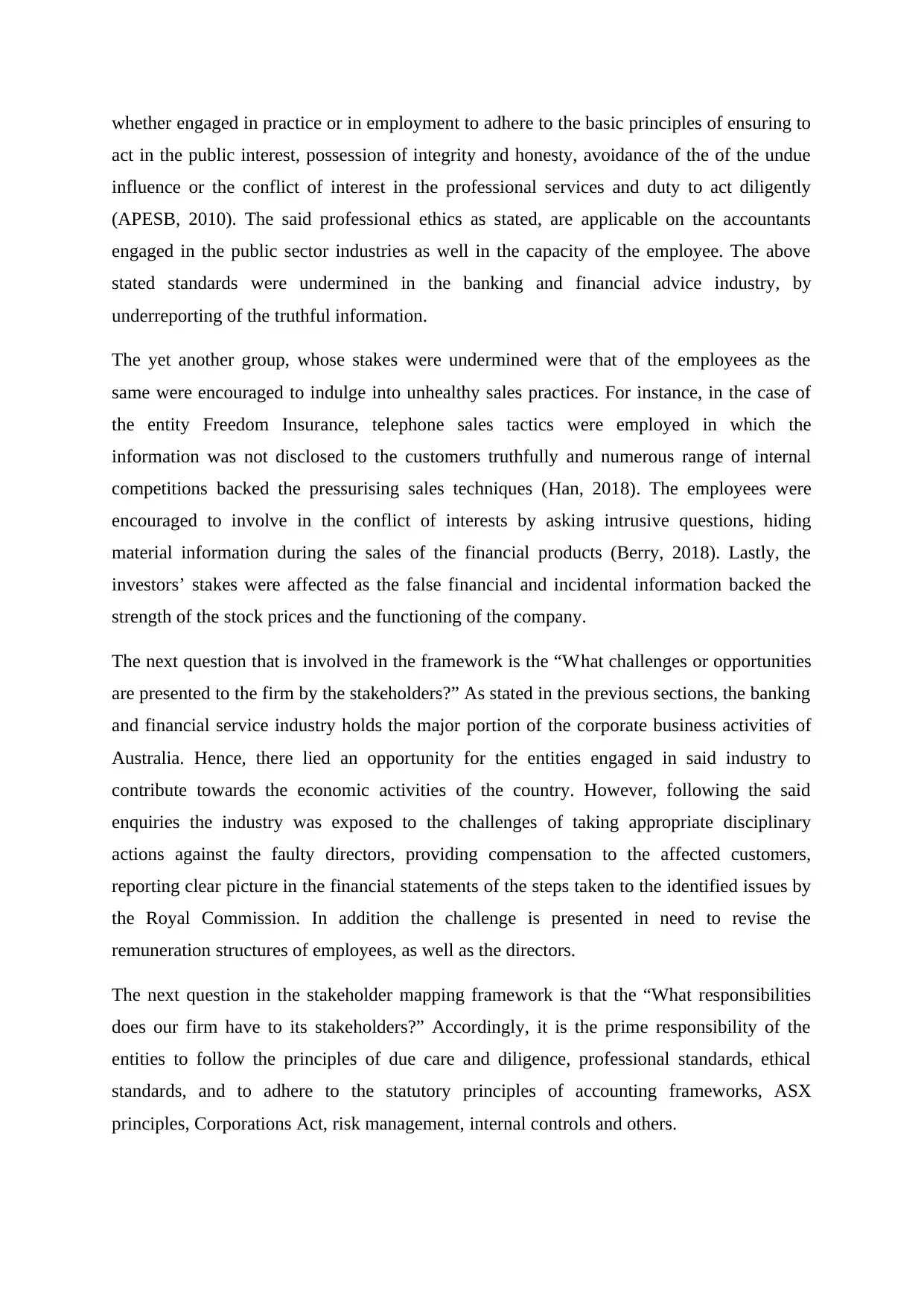
whether engaged in practice or in employment to adhere to the basic principles of ensuring to
act in the public interest, possession of integrity and honesty, avoidance of the of the undue
influence or the conflict of interest in the professional services and duty to act diligently
(APESB, 2010). The said professional ethics as stated, are applicable on the accountants
engaged in the public sector industries as well in the capacity of the employee. The above
stated standards were undermined in the banking and financial advice industry, by
underreporting of the truthful information.
The yet another group, whose stakes were undermined were that of the employees as the
same were encouraged to indulge into unhealthy sales practices. For instance, in the case of
the entity Freedom Insurance, telephone sales tactics were employed in which the
information was not disclosed to the customers truthfully and numerous range of internal
competitions backed the pressurising sales techniques (Han, 2018). The employees were
encouraged to involve in the conflict of interests by asking intrusive questions, hiding
material information during the sales of the financial products (Berry, 2018). Lastly, the
investors’ stakes were affected as the false financial and incidental information backed the
strength of the stock prices and the functioning of the company.
The next question that is involved in the framework is the “What challenges or opportunities
are presented to the firm by the stakeholders?” As stated in the previous sections, the banking
and financial service industry holds the major portion of the corporate business activities of
Australia. Hence, there lied an opportunity for the entities engaged in said industry to
contribute towards the economic activities of the country. However, following the said
enquiries the industry was exposed to the challenges of taking appropriate disciplinary
actions against the faulty directors, providing compensation to the affected customers,
reporting clear picture in the financial statements of the steps taken to the identified issues by
the Royal Commission. In addition the challenge is presented in need to revise the
remuneration structures of employees, as well as the directors.
The next question in the stakeholder mapping framework is that the “What responsibilities
does our firm have to its stakeholders?” Accordingly, it is the prime responsibility of the
entities to follow the principles of due care and diligence, professional standards, ethical
standards, and to adhere to the statutory principles of accounting frameworks, ASX
principles, Corporations Act, risk management, internal controls and others.
act in the public interest, possession of integrity and honesty, avoidance of the of the undue
influence or the conflict of interest in the professional services and duty to act diligently
(APESB, 2010). The said professional ethics as stated, are applicable on the accountants
engaged in the public sector industries as well in the capacity of the employee. The above
stated standards were undermined in the banking and financial advice industry, by
underreporting of the truthful information.
The yet another group, whose stakes were undermined were that of the employees as the
same were encouraged to indulge into unhealthy sales practices. For instance, in the case of
the entity Freedom Insurance, telephone sales tactics were employed in which the
information was not disclosed to the customers truthfully and numerous range of internal
competitions backed the pressurising sales techniques (Han, 2018). The employees were
encouraged to involve in the conflict of interests by asking intrusive questions, hiding
material information during the sales of the financial products (Berry, 2018). Lastly, the
investors’ stakes were affected as the false financial and incidental information backed the
strength of the stock prices and the functioning of the company.
The next question that is involved in the framework is the “What challenges or opportunities
are presented to the firm by the stakeholders?” As stated in the previous sections, the banking
and financial service industry holds the major portion of the corporate business activities of
Australia. Hence, there lied an opportunity for the entities engaged in said industry to
contribute towards the economic activities of the country. However, following the said
enquiries the industry was exposed to the challenges of taking appropriate disciplinary
actions against the faulty directors, providing compensation to the affected customers,
reporting clear picture in the financial statements of the steps taken to the identified issues by
the Royal Commission. In addition the challenge is presented in need to revise the
remuneration structures of employees, as well as the directors.
The next question in the stakeholder mapping framework is that the “What responsibilities
does our firm have to its stakeholders?” Accordingly, it is the prime responsibility of the
entities to follow the principles of due care and diligence, professional standards, ethical
standards, and to adhere to the statutory principles of accounting frameworks, ASX
principles, Corporations Act, risk management, internal controls and others.
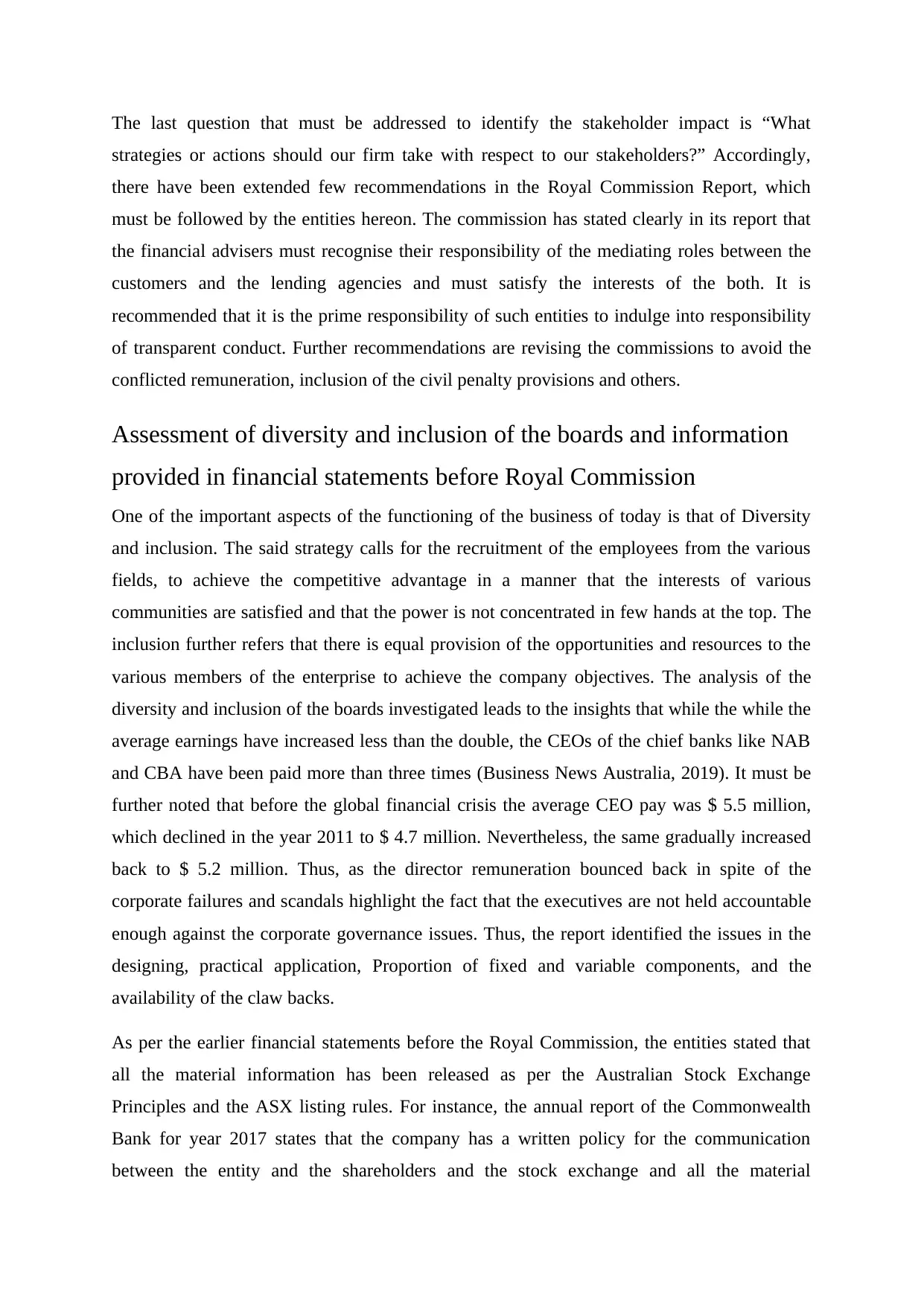
The last question that must be addressed to identify the stakeholder impact is “What
strategies or actions should our firm take with respect to our stakeholders?” Accordingly,
there have been extended few recommendations in the Royal Commission Report, which
must be followed by the entities hereon. The commission has stated clearly in its report that
the financial advisers must recognise their responsibility of the mediating roles between the
customers and the lending agencies and must satisfy the interests of the both. It is
recommended that it is the prime responsibility of such entities to indulge into responsibility
of transparent conduct. Further recommendations are revising the commissions to avoid the
conflicted remuneration, inclusion of the civil penalty provisions and others.
Assessment of diversity and inclusion of the boards and information
provided in financial statements before Royal Commission
One of the important aspects of the functioning of the business of today is that of Diversity
and inclusion. The said strategy calls for the recruitment of the employees from the various
fields, to achieve the competitive advantage in a manner that the interests of various
communities are satisfied and that the power is not concentrated in few hands at the top. The
inclusion further refers that there is equal provision of the opportunities and resources to the
various members of the enterprise to achieve the company objectives. The analysis of the
diversity and inclusion of the boards investigated leads to the insights that while the while the
average earnings have increased less than the double, the CEOs of the chief banks like NAB
and CBA have been paid more than three times (Business News Australia, 2019). It must be
further noted that before the global financial crisis the average CEO pay was $ 5.5 million,
which declined in the year 2011 to $ 4.7 million. Nevertheless, the same gradually increased
back to $ 5.2 million. Thus, as the director remuneration bounced back in spite of the
corporate failures and scandals highlight the fact that the executives are not held accountable
enough against the corporate governance issues. Thus, the report identified the issues in the
designing, practical application, Proportion of fixed and variable components, and the
availability of the claw backs.
As per the earlier financial statements before the Royal Commission, the entities stated that
all the material information has been released as per the Australian Stock Exchange
Principles and the ASX listing rules. For instance, the annual report of the Commonwealth
Bank for year 2017 states that the company has a written policy for the communication
between the entity and the shareholders and the stock exchange and all the material
strategies or actions should our firm take with respect to our stakeholders?” Accordingly,
there have been extended few recommendations in the Royal Commission Report, which
must be followed by the entities hereon. The commission has stated clearly in its report that
the financial advisers must recognise their responsibility of the mediating roles between the
customers and the lending agencies and must satisfy the interests of the both. It is
recommended that it is the prime responsibility of such entities to indulge into responsibility
of transparent conduct. Further recommendations are revising the commissions to avoid the
conflicted remuneration, inclusion of the civil penalty provisions and others.
Assessment of diversity and inclusion of the boards and information
provided in financial statements before Royal Commission
One of the important aspects of the functioning of the business of today is that of Diversity
and inclusion. The said strategy calls for the recruitment of the employees from the various
fields, to achieve the competitive advantage in a manner that the interests of various
communities are satisfied and that the power is not concentrated in few hands at the top. The
inclusion further refers that there is equal provision of the opportunities and resources to the
various members of the enterprise to achieve the company objectives. The analysis of the
diversity and inclusion of the boards investigated leads to the insights that while the while the
average earnings have increased less than the double, the CEOs of the chief banks like NAB
and CBA have been paid more than three times (Business News Australia, 2019). It must be
further noted that before the global financial crisis the average CEO pay was $ 5.5 million,
which declined in the year 2011 to $ 4.7 million. Nevertheless, the same gradually increased
back to $ 5.2 million. Thus, as the director remuneration bounced back in spite of the
corporate failures and scandals highlight the fact that the executives are not held accountable
enough against the corporate governance issues. Thus, the report identified the issues in the
designing, practical application, Proportion of fixed and variable components, and the
availability of the claw backs.
As per the earlier financial statements before the Royal Commission, the entities stated that
all the material information has been released as per the Australian Stock Exchange
Principles and the ASX listing rules. For instance, the annual report of the Commonwealth
Bank for year 2017 states that the company has a written policy for the communication
between the entity and the shareholders and the stock exchange and all the material
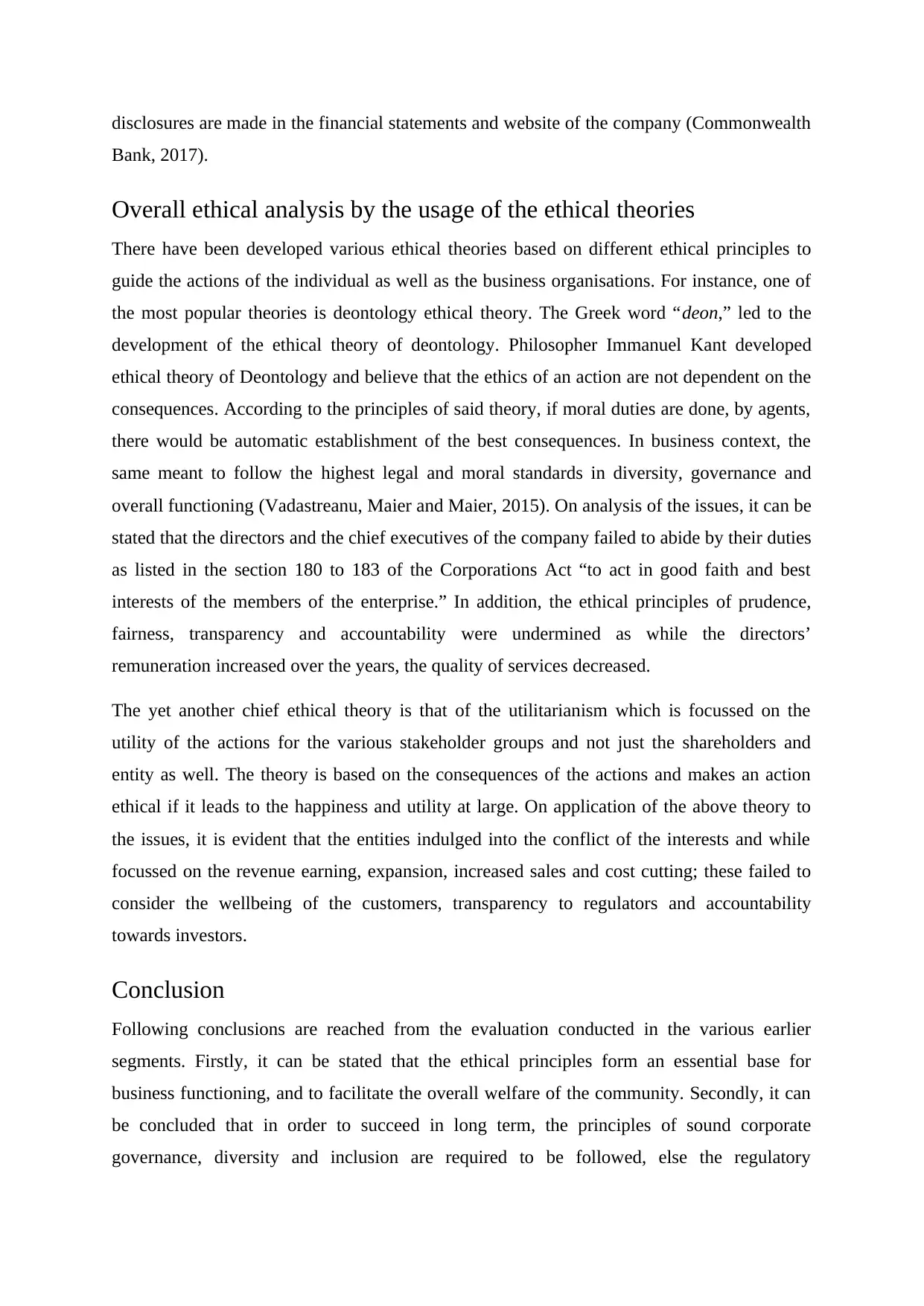
disclosures are made in the financial statements and website of the company (Commonwealth
Bank, 2017).
Overall ethical analysis by the usage of the ethical theories
There have been developed various ethical theories based on different ethical principles to
guide the actions of the individual as well as the business organisations. For instance, one of
the most popular theories is deontology ethical theory. The Greek word “deon,” led to the
development of the ethical theory of deontology. Philosopher Immanuel Kant developed
ethical theory of Deontology and believe that the ethics of an action are not dependent on the
consequences. According to the principles of said theory, if moral duties are done, by agents,
there would be automatic establishment of the best consequences. In business context, the
same meant to follow the highest legal and moral standards in diversity, governance and
overall functioning (Vadastreanu, Maier and Maier, 2015). On analysis of the issues, it can be
stated that the directors and the chief executives of the company failed to abide by their duties
as listed in the section 180 to 183 of the Corporations Act “to act in good faith and best
interests of the members of the enterprise.” In addition, the ethical principles of prudence,
fairness, transparency and accountability were undermined as while the directors’
remuneration increased over the years, the quality of services decreased.
The yet another chief ethical theory is that of the utilitarianism which is focussed on the
utility of the actions for the various stakeholder groups and not just the shareholders and
entity as well. The theory is based on the consequences of the actions and makes an action
ethical if it leads to the happiness and utility at large. On application of the above theory to
the issues, it is evident that the entities indulged into the conflict of the interests and while
focussed on the revenue earning, expansion, increased sales and cost cutting; these failed to
consider the wellbeing of the customers, transparency to regulators and accountability
towards investors.
Conclusion
Following conclusions are reached from the evaluation conducted in the various earlier
segments. Firstly, it can be stated that the ethical principles form an essential base for
business functioning, and to facilitate the overall welfare of the community. Secondly, it can
be concluded that in order to succeed in long term, the principles of sound corporate
governance, diversity and inclusion are required to be followed, else the regulatory
Bank, 2017).
Overall ethical analysis by the usage of the ethical theories
There have been developed various ethical theories based on different ethical principles to
guide the actions of the individual as well as the business organisations. For instance, one of
the most popular theories is deontology ethical theory. The Greek word “deon,” led to the
development of the ethical theory of deontology. Philosopher Immanuel Kant developed
ethical theory of Deontology and believe that the ethics of an action are not dependent on the
consequences. According to the principles of said theory, if moral duties are done, by agents,
there would be automatic establishment of the best consequences. In business context, the
same meant to follow the highest legal and moral standards in diversity, governance and
overall functioning (Vadastreanu, Maier and Maier, 2015). On analysis of the issues, it can be
stated that the directors and the chief executives of the company failed to abide by their duties
as listed in the section 180 to 183 of the Corporations Act “to act in good faith and best
interests of the members of the enterprise.” In addition, the ethical principles of prudence,
fairness, transparency and accountability were undermined as while the directors’
remuneration increased over the years, the quality of services decreased.
The yet another chief ethical theory is that of the utilitarianism which is focussed on the
utility of the actions for the various stakeholder groups and not just the shareholders and
entity as well. The theory is based on the consequences of the actions and makes an action
ethical if it leads to the happiness and utility at large. On application of the above theory to
the issues, it is evident that the entities indulged into the conflict of the interests and while
focussed on the revenue earning, expansion, increased sales and cost cutting; these failed to
consider the wellbeing of the customers, transparency to regulators and accountability
towards investors.
Conclusion
Following conclusions are reached from the evaluation conducted in the various earlier
segments. Firstly, it can be stated that the ethical principles form an essential base for
business functioning, and to facilitate the overall welfare of the community. Secondly, it can
be concluded that in order to succeed in long term, the principles of sound corporate
governance, diversity and inclusion are required to be followed, else the regulatory
Paraphrase This Document
Need a fresh take? Get an instant paraphrase of this document with our AI Paraphraser
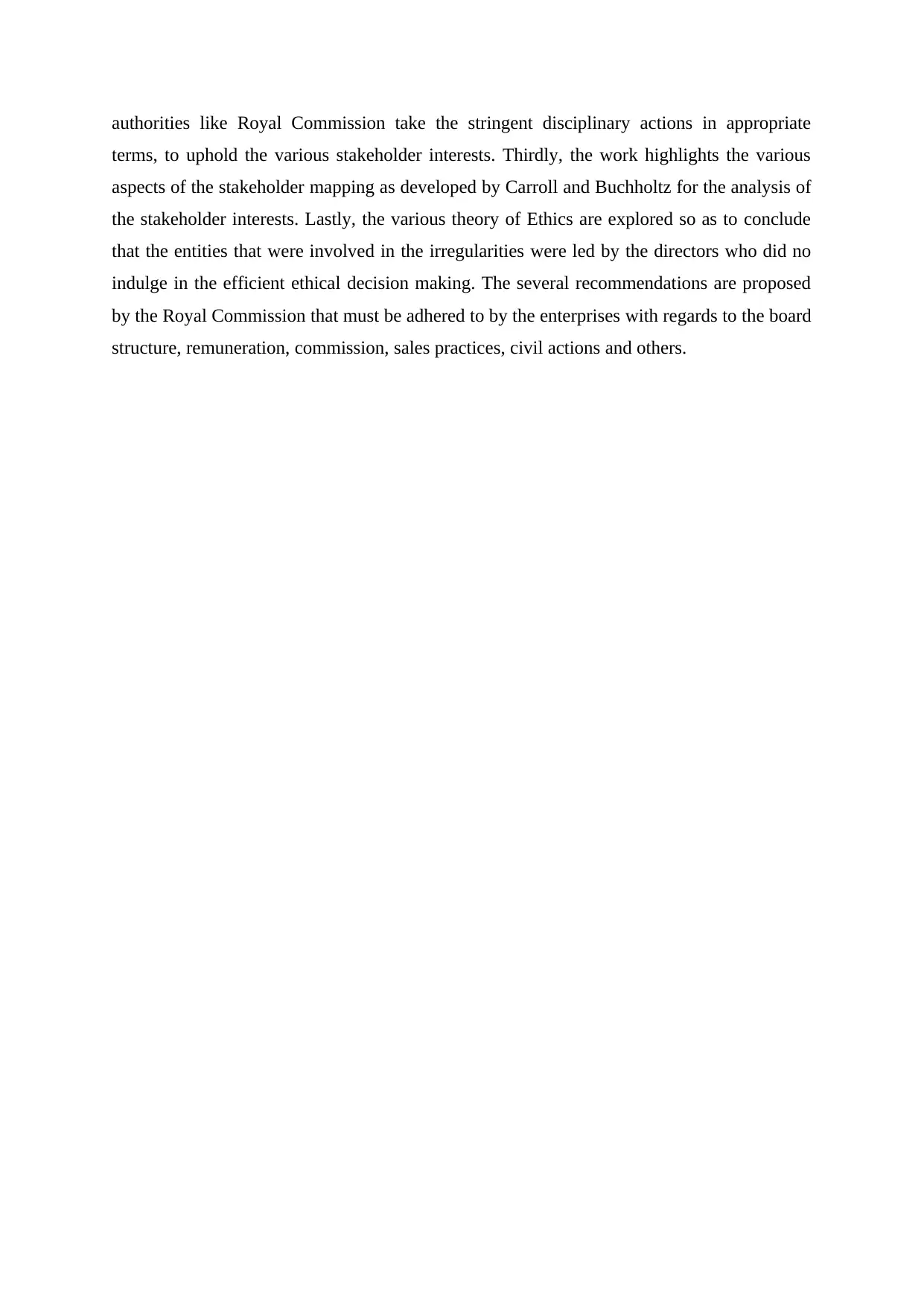
authorities like Royal Commission take the stringent disciplinary actions in appropriate
terms, to uphold the various stakeholder interests. Thirdly, the work highlights the various
aspects of the stakeholder mapping as developed by Carroll and Buchholtz for the analysis of
the stakeholder interests. Lastly, the various theory of Ethics are explored so as to conclude
that the entities that were involved in the irregularities were led by the directors who did no
indulge in the efficient ethical decision making. The several recommendations are proposed
by the Royal Commission that must be adhered to by the enterprises with regards to the board
structure, remuneration, commission, sales practices, civil actions and others.
terms, to uphold the various stakeholder interests. Thirdly, the work highlights the various
aspects of the stakeholder mapping as developed by Carroll and Buchholtz for the analysis of
the stakeholder interests. Lastly, the various theory of Ethics are explored so as to conclude
that the entities that were involved in the irregularities were led by the directors who did no
indulge in the efficient ethical decision making. The several recommendations are proposed
by the Royal Commission that must be adhered to by the enterprises with regards to the board
structure, remuneration, commission, sales practices, civil actions and others.
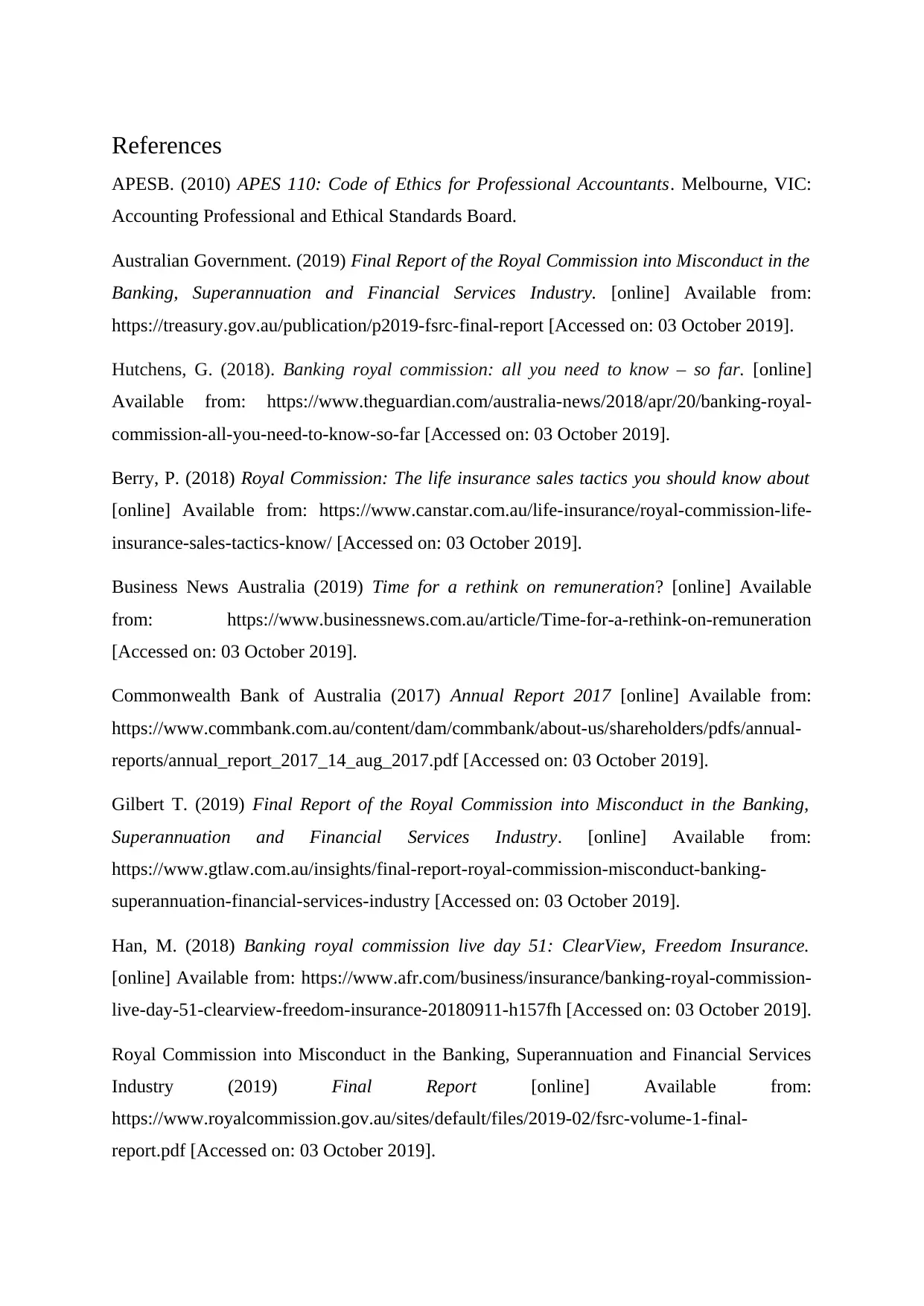
References
APESB. (2010) APES 110: Code of Ethics for Professional Accountants. Melbourne, VIC:
Accounting Professional and Ethical Standards Board.
Australian Government. (2019) Final Report of the Royal Commission into Misconduct in the
Banking, Superannuation and Financial Services Industry. [online] Available from:
https://treasury.gov.au/publication/p2019-fsrc-final-report [Accessed on: 03 October 2019].
Hutchens, G. (2018). Banking royal commission: all you need to know – so far. [online]
Available from: https://www.theguardian.com/australia-news/2018/apr/20/banking-royal-
commission-all-you-need-to-know-so-far [Accessed on: 03 October 2019].
Berry, P. (2018) Royal Commission: The life insurance sales tactics you should know about
[online] Available from: https://www.canstar.com.au/life-insurance/royal-commission-life-
insurance-sales-tactics-know/ [Accessed on: 03 October 2019].
Business News Australia (2019) Time for a rethink on remuneration? [online] Available
from: https://www.businessnews.com.au/article/Time-for-a-rethink-on-remuneration
[Accessed on: 03 October 2019].
Commonwealth Bank of Australia (2017) Annual Report 2017 [online] Available from:
https://www.commbank.com.au/content/dam/commbank/about-us/shareholders/pdfs/annual-
reports/annual_report_2017_14_aug_2017.pdf [Accessed on: 03 October 2019].
Gilbert T. (2019) Final Report of the Royal Commission into Misconduct in the Banking,
Superannuation and Financial Services Industry. [online] Available from:
https://www.gtlaw.com.au/insights/final-report-royal-commission-misconduct-banking-
superannuation-financial-services-industry [Accessed on: 03 October 2019].
Han, M. (2018) Banking royal commission live day 51: ClearView, Freedom Insurance.
[online] Available from: https://www.afr.com/business/insurance/banking-royal-commission-
live-day-51-clearview-freedom-insurance-20180911-h157fh [Accessed on: 03 October 2019].
Royal Commission into Misconduct in the Banking, Superannuation and Financial Services
Industry (2019) Final Report [online] Available from:
https://www.royalcommission.gov.au/sites/default/files/2019-02/fsrc-volume-1-final-
report.pdf [Accessed on: 03 October 2019].
APESB. (2010) APES 110: Code of Ethics for Professional Accountants. Melbourne, VIC:
Accounting Professional and Ethical Standards Board.
Australian Government. (2019) Final Report of the Royal Commission into Misconduct in the
Banking, Superannuation and Financial Services Industry. [online] Available from:
https://treasury.gov.au/publication/p2019-fsrc-final-report [Accessed on: 03 October 2019].
Hutchens, G. (2018). Banking royal commission: all you need to know – so far. [online]
Available from: https://www.theguardian.com/australia-news/2018/apr/20/banking-royal-
commission-all-you-need-to-know-so-far [Accessed on: 03 October 2019].
Berry, P. (2018) Royal Commission: The life insurance sales tactics you should know about
[online] Available from: https://www.canstar.com.au/life-insurance/royal-commission-life-
insurance-sales-tactics-know/ [Accessed on: 03 October 2019].
Business News Australia (2019) Time for a rethink on remuneration? [online] Available
from: https://www.businessnews.com.au/article/Time-for-a-rethink-on-remuneration
[Accessed on: 03 October 2019].
Commonwealth Bank of Australia (2017) Annual Report 2017 [online] Available from:
https://www.commbank.com.au/content/dam/commbank/about-us/shareholders/pdfs/annual-
reports/annual_report_2017_14_aug_2017.pdf [Accessed on: 03 October 2019].
Gilbert T. (2019) Final Report of the Royal Commission into Misconduct in the Banking,
Superannuation and Financial Services Industry. [online] Available from:
https://www.gtlaw.com.au/insights/final-report-royal-commission-misconduct-banking-
superannuation-financial-services-industry [Accessed on: 03 October 2019].
Han, M. (2018) Banking royal commission live day 51: ClearView, Freedom Insurance.
[online] Available from: https://www.afr.com/business/insurance/banking-royal-commission-
live-day-51-clearview-freedom-insurance-20180911-h157fh [Accessed on: 03 October 2019].
Royal Commission into Misconduct in the Banking, Superannuation and Financial Services
Industry (2019) Final Report [online] Available from:
https://www.royalcommission.gov.au/sites/default/files/2019-02/fsrc-volume-1-final-
report.pdf [Accessed on: 03 October 2019].

Vadastreanu, A. M., Maier, D., & Maier, A. (2015) Is the success possible in compliance
with ethics and deontology in business?. Procedia Economics and Finance, 26, pp. 1068-
1073.
with ethics and deontology in business?. Procedia Economics and Finance, 26, pp. 1068-
1073.
1 out of 10
Related Documents
Your All-in-One AI-Powered Toolkit for Academic Success.
+13062052269
info@desklib.com
Available 24*7 on WhatsApp / Email
![[object Object]](/_next/static/media/star-bottom.7253800d.svg)
Unlock your academic potential
© 2024 | Zucol Services PVT LTD | All rights reserved.





